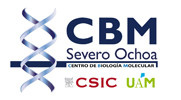Regulatory functions and mechanisms of cell signaling pathways through G proteins: a new interactome
Prof. Catalina Ribas Núñez. Profesora Titular. Departamento de Biología Molecular. UAM.
Prof. Inmaculada Navarro. Profesora Ayudante Doctora. Departamento de Biología Molecular. UAM.
Our laboratory is investigating key nodes in signaling networks involved in both physiological and pathological conditions and the molecular mechanisms involved. G-protein-coupled receptors (GPCRs) are a family of membrane proteins with great physiological and pharmacological importance. In particular, Gq protein-coupled receptors (Gq-GPCR) are increasingly involved in pathologies such as cardiovascular/metabolic diseases and cancer. In recent years, the Gαq interactome has expanded considerably with the description of new effectors, helping to improve our understanding of the cellular and physiological events controlled by this Gα subunit. Recently, our group has contributed in the last year to unveil a new adapter role for Gq, through a new interaction region in Gαq, different from the classical effector-binding region. Our recent results reveal an unforeseen connection between non-canonical Gq signaling and cell homeostasis. Furthermore, Gαq is known to interact with various components of the cytoskeleton, as well as with important membrane microdomain organizers, suggesting the existence of signaling complexes that could be limited to specific subcellular environments.
The main objective of our group is to understand how changes in Gq-GPCR signaling (involving different types of cells and tissues) are integrated at the cellular and organism level, and how they can promote the progression of pathologies, using cell and animal models with altered expression/activity of this protein, as well as samples from patients or animal models of disease. We will focus particularly on the functional impact of this new interactome of Gαq and its modulation by accessory proteins (such as GRKs, Caveolins, AGS, RGS, EBP50, Ric8), with emphasis on how chemical and/or mechanical inputs on Gq signaling play a role in autophagy/exosome trafficking, endothelial dysfunction/inflammation and tumor microenvironment/cancer progression. The identification of new signaling pathways that relate Gαq to the crosstalk between different cell homeostasis and communication machineries will provide a better understanding of the impact of maladaptive Gq-coupled GPCR activation in pathological conditions.
In addition, and in close collaboration with other members of our CBMSO Programme, we use cellular and animal models with altered GRK2 levels or functionality to study:
– Epidermal homeostasis and keratinocyte-immune cells crosstalk. Impact of GRK2 deletion in keratinocytes in the skin immune cell landscape, barrier function, skin-microbiome interaction and hair follicle homeostasis, and in the susceptibility to inflammatory diseases and squamous cell carcinomas (in collaboration with F.Mayor).


